How Do You Run a City of 650,000 Residents? These Terriers Have Some Insights
BU City Scholars Summer Fellows look back on what they learned during summer internships
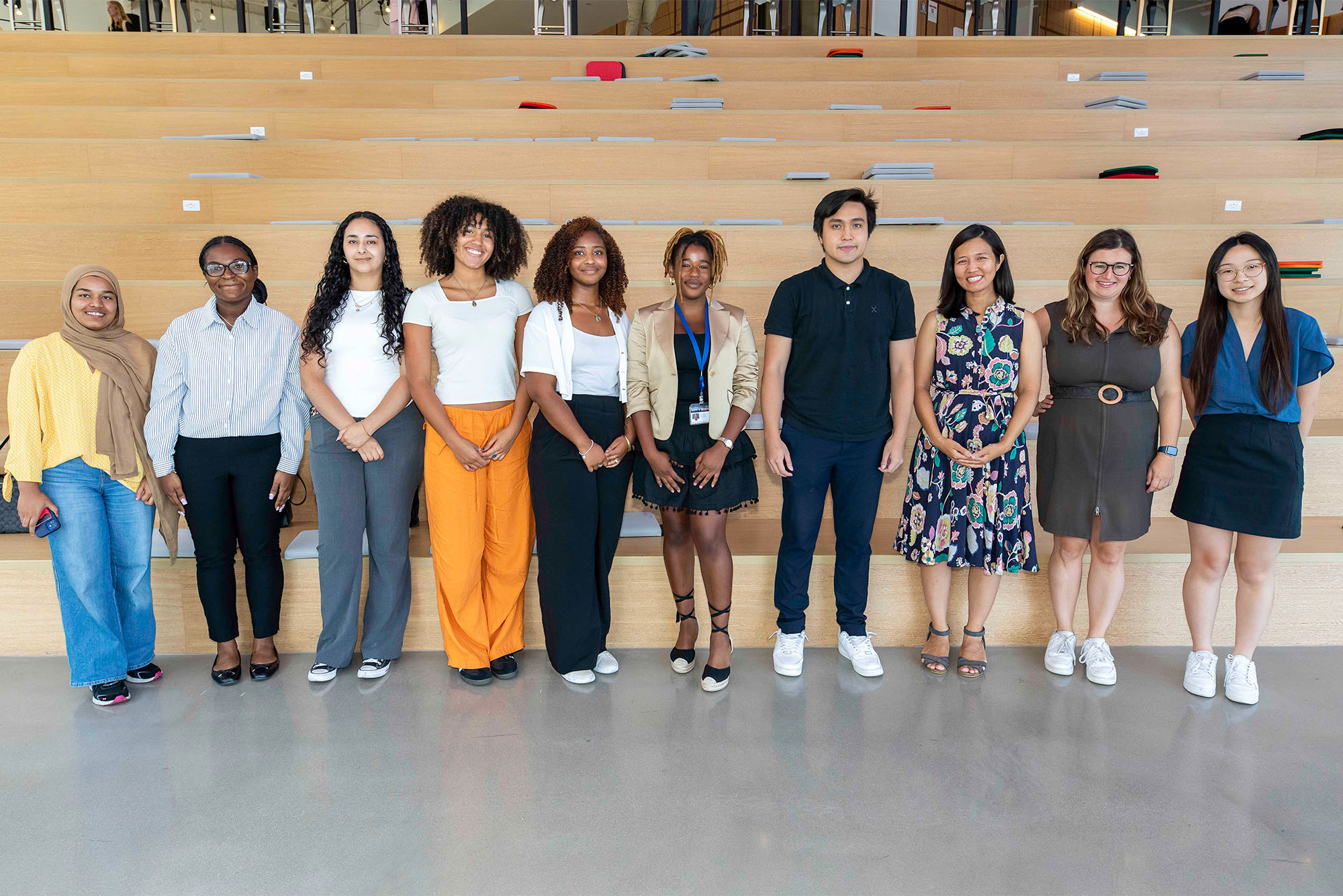
BU City Scholars Summer interns Hafcha Khanam (CAS’26) (from left), Bianca Watkins-Charlemagne (CAS’26), Sihem Hadj Sahraoui (CAS’26), Alexandria McKenzie (CAS’26), one of this year’s BU Initiative on Cities interns, Naomi Knight (Pardee’26), Nitz-fa Dimanche (CAS’25), Elton Lam (CAS’25), Boston Mayor Michelle Wu, Alex Lawrence, city of Boston chief people officer, and Jennifer Chen (CAS’25, Sargent’25). Not pictured: BU City Scholars Summer Fellows Hazel McLaughlin (CAS’26), Catherine Hayes-Tierney (CGS’24, CAS’26), and Jianhan Wang (CDS’26). Photo courtesy of City of Boston
How Do You Run a City of 650,000 Residents? These Terriers Have Some Insights
BU City Scholars Summer Fellows look back on what they learned during summer internships
It’s been a hectic summer at Boston City Hall. In addition to hosting dozens of free arts and cultural events, there was the launch of the Boston Rodent Action Plan (BRAP), a new coordinated multiagency initiative to mitigate the rodent population in the city, as well as a first-ever citywide participatory budgeting initiative and a new Boston E-Bikes incentive program, which provides discount vouchers for residents who want to purchase an e-Bike. There was also the allocation of nearly $4 million to support job training and education programs and $40 million in funding for the construction of affordable housing projects.
And that’s just for starters. But perhaps the most exciting news to come out of City Hall this summer was Mayor Michelle Wu’s announcement that she is expecting a baby in January.
What does it take to keep a city of 650,000 residents running smoothly? How do you ensure that City Hall’s 19 departments, 19,000 employees, and an operating budget of $4.6 billion perform efficiently to meet Bostonians’ needs? Each year a few BU students get a chance to find out for themselves when they are selected as BU City Scholars Summer Fellows. The program, funded by BU’s Office of Government & Community Affairs, provides an opportunity for full-time rising juniors and seniors who are Thomas M. Menino Scholarship or Boston Community Service Award recipients to spend 10 weeks interning with various City Hall departments, working for City Council members, conducting research, writing reports, and helping to address the needs of constituents across the city. This year, 10 students were selected to take part in the program. And they weren’t the only Terriers interning in Government Plaza. An additional three students spent the summer as BU Initiative on Cities Summer Interns and Fellows.
We asked this year’s BU City Scholars Summer Fellows to share some reflections of what they learned this summer working at City Hall and how the experience may shape their future career plans. Take a look.
Jennifer Chen (CAS’25, Sargent’25)
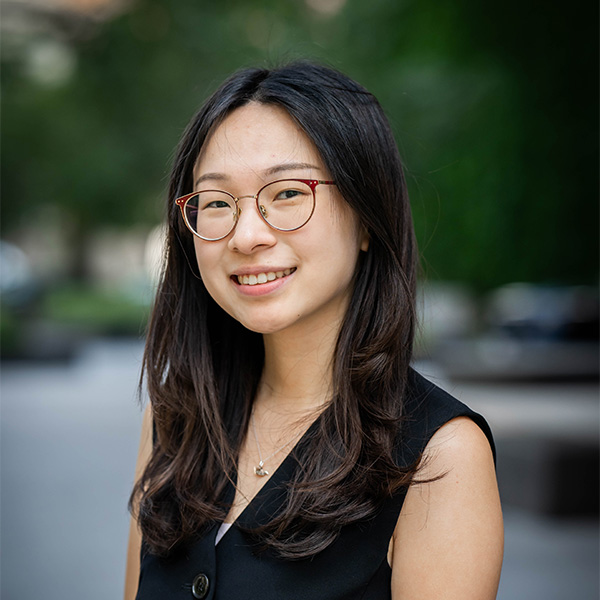
This summer, I had the privilege of working in the Mayor’s Schools and Youth Cabinet under senior advisor Rebecca Grainger and director Jisca Phillipe. During my internship, I worked very closely with Boston Public Schools (BPS) staff and conducted research and reviewed Boston School Committee meetings and practices, as well as other priorities of the Mayor’s Office, such as BPS youth athletics and hub schools. As a Boston resident who grew up in the Boston Public School system, I was eager to intern at City Hall. Having benefited from numerous resources available to underrepresented communities, I was inspired to learn about the inner workings of the city.
I was able to sit in meetings with some of the Boston School Committee members, along with colleagues across other departments. It was eye-opening to see the numerous departments involved in running the city of Boston and to observe how, despite their different functions, they collaborate effectively to manage the city. For instance, although I primarily worked in the Youth and Schools division, I had the opportunity to observe other projects. My personal favorite was the heat resilience solutions project, which involved the implementation of portable misting tents and towers in different city neighborhoods. I am truly thankful for the opportunity to be able to witness firsthand the positive impact of the city’s work. As of now, I’m not sure where my career path lies, but working in public service definitely holds a place in my heart.
Sihem Hadj Sahraoui (CAS’26)
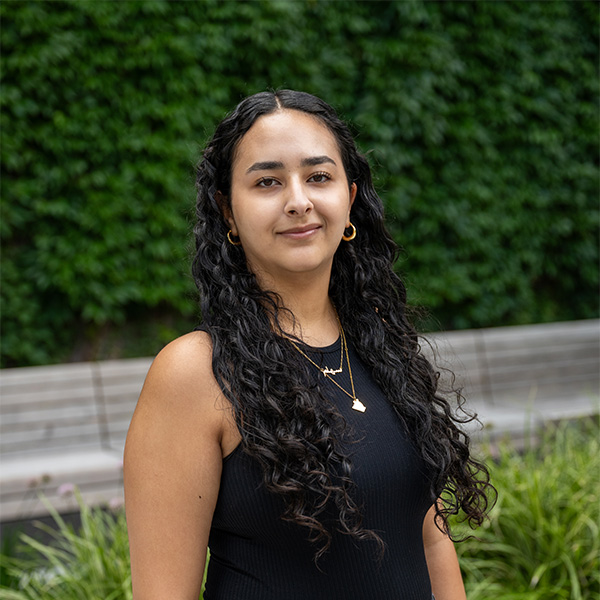
I had the opportunity to work during this past summer in the Boston Transportation Department through the city’s Streets Cabinet. During my fellowship, I participated in numerous site visits to photograph and assess new installations aimed at increasing road safety and reducing speeding, as part of the city’s Neighborhood Slow Streets initiative. I was also involved in community engagement, where we directly communicated with constituents, gathered feedback, and distributed information on major projects like the South Huntington Avenue E-Branch Accessibility project.
My daily tasks included responding to residents’ questions and requests via email, providing information about the city’s streets and transportation. I contributed social media content to boost engagement for projects and opportunities such as Boston Bikes Adult Learn-To-Bike workshops and helped to create the Young Planners Program, an intern-led initiative that encourages youth participation in community engagement by offering community service hours to high school students. The process involved designing flyers, developing the application, and presenting the program. I’m excited to see its future growth and the increasing involvement of youth voices in important city decisions.
I thoroughly enjoyed being out in the field and learning about different parts of Boston and communities I’ve never had the opportunity to experience before. Spending time in the field has given me a critical perspective on what makes a street safe and accessible. Observing the planning and results of safety features like raised crosswalks and speed humps and witnessing firsthand their positive impact was incredibly rewarding. I am grateful for this opportunity and for the chance to work with such a dedicated team. Although I’m currently a sociology major with plans to go to law school, this experience has inspired me to consider a possible career in government.
Bianca Watkins-Charlemagne (CAS’26)
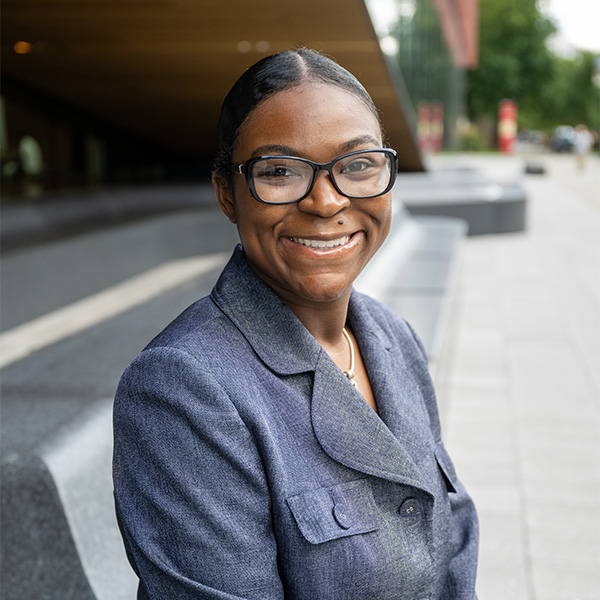
For my internship, I worked in the office of City Council President Ruthzee Louijeune. My duties included attending weekly city council meetings and hearings and community events. They provided valuable insights into citywide concerns and services, including the mayor’s budget, the modernization of Article 80 of the Boston Zoning Code (the regulatory process that determines how development proposals are reviewed), and the use of ShotSpotter technology, an audio technology designed to detect gunshots.
One research project I took on was to find support and guidance for nonprofit organizations. This aspect of the work was particularly meaningful to me given my previous experience at a nonprofit law firm, which helped me understand the crucial role nonprofits play in supporting local communities and individuals in need.
My interest in interning at City Hall this summer stemmed from a desire to deepen my understanding of government, explore the range of city services, and gain behind-the-scenes insight into managing a complex and diverse city. As a lifelong Boston resident, I previously had limited knowledge about the city’s legislative processes. Over the past 10 weeks, I have learned more about Boston than ever before. The most rewarding aspect of my internship has been the opportunity to become deeply engaged with the city I’ve always lived in and the chance to contribute to meaningful change through the research projects I participated in.
An enlightening project I undertook involved reviving a critical City Government booklet that had ceased publication in 2006. This task required extensive data analysis and a meticulous review of historical editions. By researching and examining past booklets, I identified key sections that helped City Hall staff and residents navigate city services. I then updated and modernized the booklet with additional resources and information to better assist people in accessing the services they need. This experience has confirmed my desire to pursue a career focused on research, community engagement, and advocacy.
Elton Lam (CAS’25)
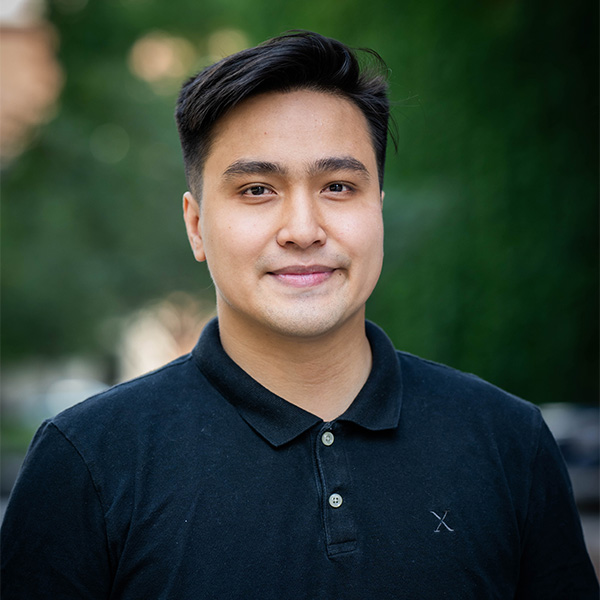
I interned this summer for the Mayor’s Office of Tourism, Sports, and Entertainment. One of my main responsibilities was ensuring that residents and tourists were aware of particular events happening in Boston. I sent out mass communication letters as well as creating flyers and posters. Additionally, I had the opportunity to work with director John Borders on various events. My favorite project was working on an upcoming sneaker event called Sole Summit, which aims to provide Boston youth with networking and potential job opportunities. Growing up as a big sneakerhead, I was able to offer a unique perspective in setting up the event.
One of the biggest things I learned was how much effort it actually takes to run the department. If a film shoot or street parade needs to happen in Boston, organizers must first go through a rigorous process—everything from obtaining the necessary permits to ensuring that all safety codes are met. It truly is a team effort, and all the people working in this department make the process seem effortless.
The best part of my experience was being part of the Celtics championship parade. It had been more than a decade since Boston had seen the Celtics win an NBA championship. I was able to walk the entire parade route right next to the duck boats carrying the team’s players and coaches. It was a surreal moment to see a sea of green with people from all over Massachusetts and New England gathering and celebrating a long-overdue championship.
I had the pleasure of working with people at City Hall who truly cared about their work and had a passion for the city. This experience has definitely opened my eyes to a career in government, as I want to contribute to improvements and a higher quality of life for the residents of Boston.
Naomi Knight (Pardee’26)
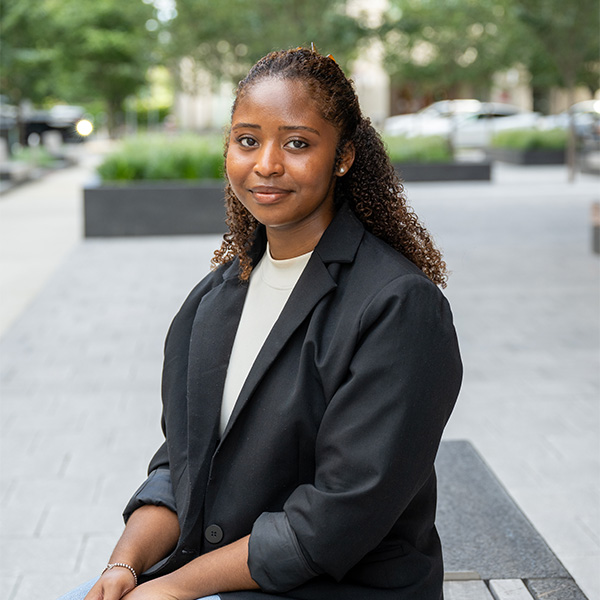
Over the past couple of months, I had the amazing opportunity to intern with the Mayor’s Office of Civic Organizing. During my time there, I helped to manage and distribute block party grants, design social media posts and website updates, and plan the beginning of 2025’s Civic Summit. I also conducted a summerlong project researching different civic engagement initiatives and programs my office could incorporate that would benefit the city of Boston and its residents. Through my time at City Hall, I learned so much about project management, effective internal and external communications, and how to be a better community member.
As a native Bostonian, I grew up with the belief—like many—that City Hall rarely did enough for its residents. Working there this summer has shown me that that is far from the truth, and that many city employees work hard to make sure that Boston can be a vibrant city and accessible to all of its residents. I was able to see and hear how my colleagues were laying the groundwork to ensure every neighborhood and all voices are heard.
The best part of interning with the Mayor’s Office of Civic Organizing was all the amazing people I met and the new connections I made within the city. It was amazing to see how passionate people are about Boston and how dedicated they are to making it better every day.
Hazel McLaughlin (CAS’26)
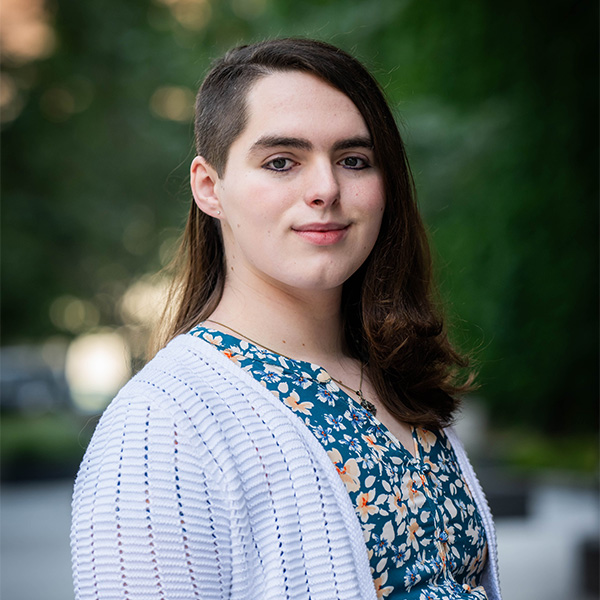
As part of Boston University’s Summer City Scholars Summer Fellowship, I had the opportunity to intern with Liz Breadon, the city councilor for Boston’s 9th district (Allston/Brighton). The bulk of my time was spent investigating and planning for a proposed affordable housing development in Allston that would transform the currently decommissioned Jackson-Mann Community Center for use as a site for colocated housing. The project would call for the construction of hundreds of new affordable housing units, paired with community resources, all of which would be owned and operated by the city. For me, this meant weeks of research assessing similar “housing with public assets” developments across the country, background checks on community groups and real estate firms, and becoming more familiar with assessor office tax codes than I ever imagined
I also learned the importance of navigating political spaces with respect to the City Council. The fellowship served as an introduction to how to play that game. Policy work doesn’t just call for skills with a spreadsheet or search engine tools, it also requires an ability to effectively network and predict the next moves of your peers. I came to City Hall to develop useful connections for a political career, and I got much more than I’d bargained for: I found myself deeply enjoying the team I got to work alongside. I entered the program already desiring a career in government, and the internship served to only redouble my confidence in this aim.
Nitz-fa Dimanche (CAS’25)
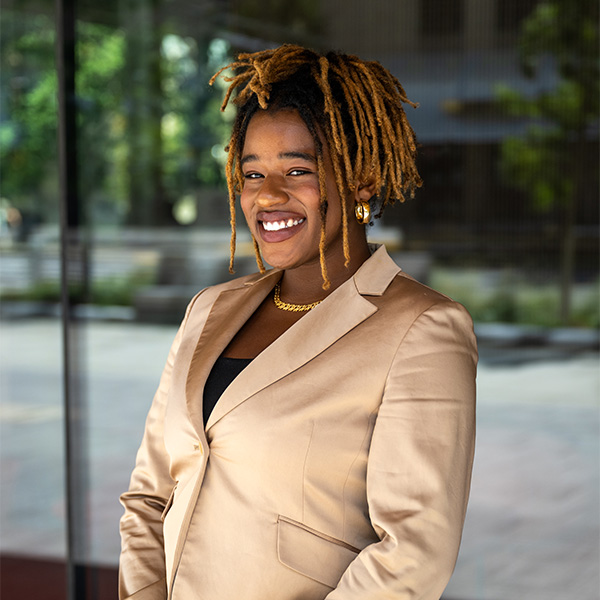
This summer, I had the privilege of interning with the Mayor’s Operations Cabinet. Working alongside chief of operations Dion Irish (CAS’94, MET’07) and special projects managers Derek Dasilva and Rakeya Edwards, I dove headfirst into the gritty reality of turning ideas into action.
From crafting Boston’s Rodent Action Plan to revamping plaza rental fees, I learned that good policy isn’t just about paperwork. It’s about rallying different departments, crunching numbers, and finding creative solutions. Who knew that a city could have 14 dedicated rodent warriors? I certainly didn’t! Joining them on a predawn patrol was an eye-opener—their commitment to tackling every single 311 report is inspiring.
A highlight of my summer was the chance to collaborate with fellow interns and experiencing the infectious energy of the Operations team. It’s clear that City Hall is a place where every issue, big or small, matters and everyone’s voice is heard.
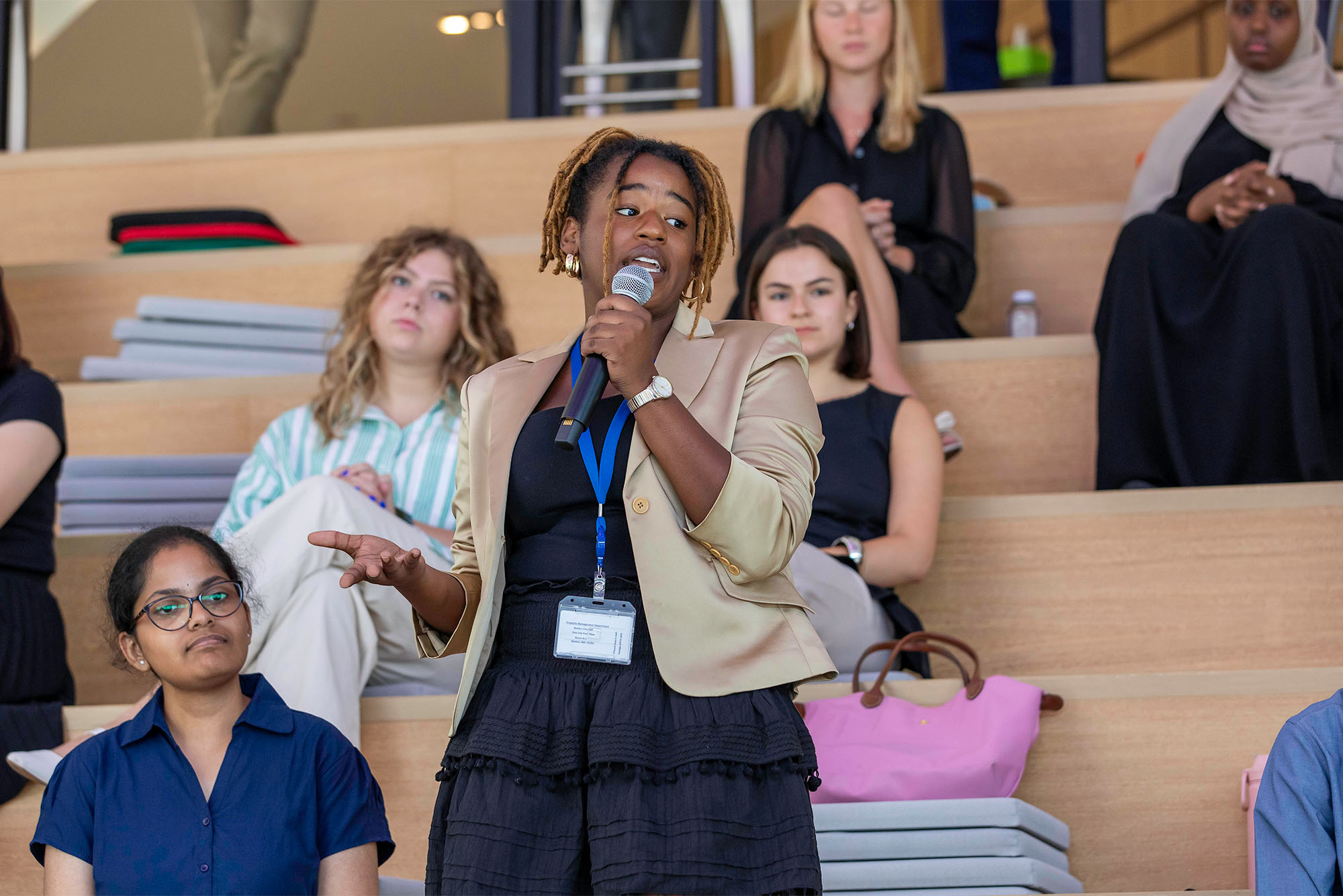
My experience as a City Scholar Summer Fellow solidified my belief in the power of public service. I’m eager to build on what I’ve learned and contribute to a city that works for everyone.
And next time you’re about to toss your food scraps, remember our unsung rodent heroes, and actually get it into the trash can!
Jianhan Wang (CDS’26)
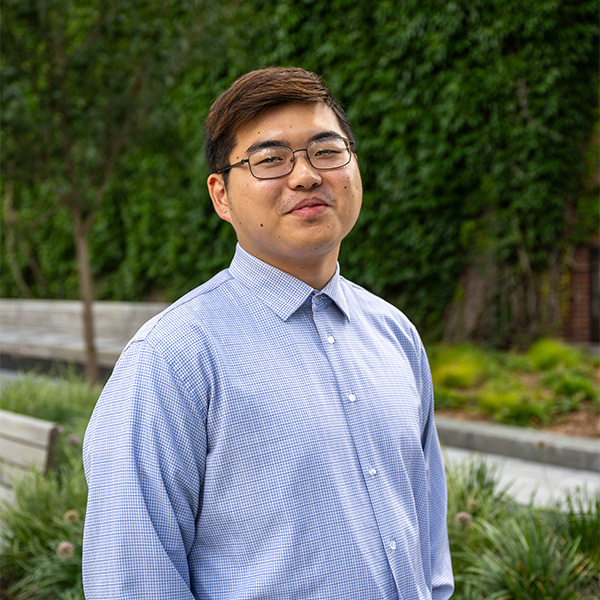
I worked for the summer in the Boston Public Schools Capital Planning department. My manager was Emanuel Zanzerkia, director of data and strategy for BPS Capital Planning, but much of my work didn’t involve analyzing data or applying data science knowledge. It involved brainstorming with different BPS departments about features that should be part of a potential forecasting tool that the department could use. From my notes, I created a mock-up/demo of how the tool might look and behave using HTML and JavaScript.
I wanted to intern at City Hall to get more experience in the public sector and potentially learn skills relevant to my data science major. The best part of the experience was meeting other interns from other universities and programs. I didn’t know what Capital Planning involves. The experience didn’t deter me from the idea of working in the public sector. I would like to try other sectors and compare from there.
Hafcha Khanam (CAS’26)
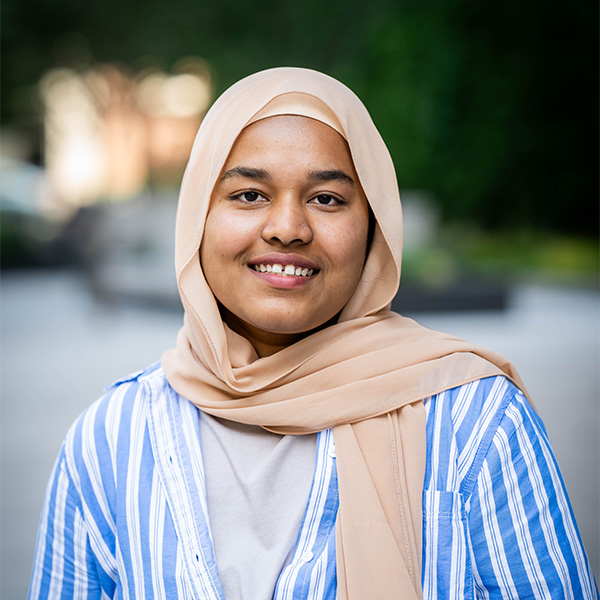
I had the opportunity to work in the Office of Language Communications Access (LCA), a division under the Mayor’s Equity and Inclusion Cabinet. There, I worked with Ivie Igbineweka, the department’s administration and finance manager. I am deeply grateful to Ivie and the entire LCA team for their support and approachability throughout my time there.
My primary responsibility was to assist in onboarding new vendors and renewing contracts with existing ones to provide language services to Boston residents. Additionally, my daily tasks included approving service requests, monitoring the LCA inbox and shared budget spreadsheet, attending team meetings, and managing other office operations. The experience taught me how to contribute effectively to group collaborations and how to combine diverse ideas to develop creative solutions. Overall, it was a rewarding experience, [being] surrounded by passionate individuals dedicated to improving the language barriers that exist in Boston’s communities.
Prior to becoming a City Scholar Summer Fellow, city government felt distant and out of reach, and I wasn’t fully aware of how much it impacts our daily lives. Now I have a much deeper understanding of the collective efforts that make life in Boston better for everyone. I have come to realize that city government is far more connected to our everyday lives than I previously realized. I am grateful to everyone who helped me along the way and made this opportunity possible. I would love to work at City Hall again, especially if it aligns with my future interests.
Catherine Hayes-Tierney (CGS’24, CAS’26)
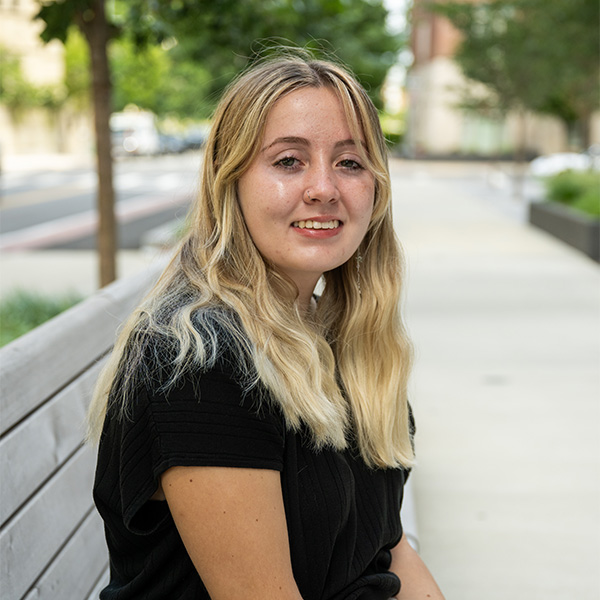
This past summer, I worked for City Councilor Sharon Durkan, who represents District 8. One of my major responsibilities was to answer phone calls and emails to provide assistance to constituents. Another of my responsibilities was helping to write letters for Councilor Durkan. In addition, I attended events and took notes during meetings. Throughout the BU City Scholars Summer Fellows program, I got to learn a lot about how the City Council operates and the role it plays within the city of Boston, as well as all the work that’s done behind the scenes. One of the major takeaways for me is how important a resource the City Council offices are for providing resources and information when people don’t know who to contact.
One of the reasons that I was interested in working in City Hall was because I am majoring in political science. As working in city government is one of the more common careers for my degree, getting the chance to work in City Hall allowed me to see if city government is something that I would want to pursue as a career.
The best part of working there for me was the people in my office. All of the staff in the District 8 office were amazing and created a supportive and welcoming environment that made going to work a lot more enjoyable. I definitely think working in city government isn’t out of the question for what I want to do after I graduate.
Comments & Discussion
Boston University moderates comments to facilitate an informed, substantive, civil conversation. Abusive, profane, self-promotional, misleading, incoherent or off-topic comments will be rejected. Moderators are staffed during regular business hours (EST) and can only accept comments written in English. Statistics or facts must include a citation or a link to the citation.